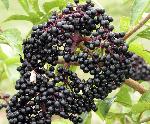COLUMBIA, Mo. – More than 120 international horticulturists, botanists, biochemists, food scientists, economists and farmers will attend the First International Symposium on Elderberry, June 9-14 at Stoney Creek Inn in Columbia.
They will gather in Missouri during the elderberry’s peak flowering season.
Researchers at the University of Missouri’s Center for Botanical Interaction Studies in Columbia are studying the antioxidant-rich elderberry’s effect in fighting prostate cancer, stroke and infectious diseases.
MU is one of five universities awarded a total of $37.5 million by the National Institutes of Health to explore the possible medical benefits of elderberries, wild yams and other herbal and dietary supplements. Over the past five years, Missouri has established the largest acreage of improved elderberry in the United States.
The elderberry, once revered by folk healers for its medicinal properties, contains dark purple and black berries that must be picked by hand. While the plant’s stems and leaves are toxic to humans, the berries are used for wine, juice, jelly, colorant and dietary supplement products.
A new 12-page guide to growing and marketing elderberries will be offered at the symposium.
For registration, preliminary program details and other information, visit the symposium website at muconf.missouri.edu/elderberrysymposium.
If you have questions, contact Andrew Thomas, MU Southwest Research Center, at 417-466-0065 or [email protected].
The University of Missouri Center for Agroforestry publication “Growing and Marketing Elderberries in Missouri” (AF1017) is available for free download at extension.missouri.edu/p/AF1017.
The Missouri Department of Agriculture’s Specialty Crop Block Grant Program provided funds for the symposium, which is organized under the auspices of the International Society for Horticultural Science.
Read more http://extension.missouri.edu/news/DisplayStory.aspx?N=1845





